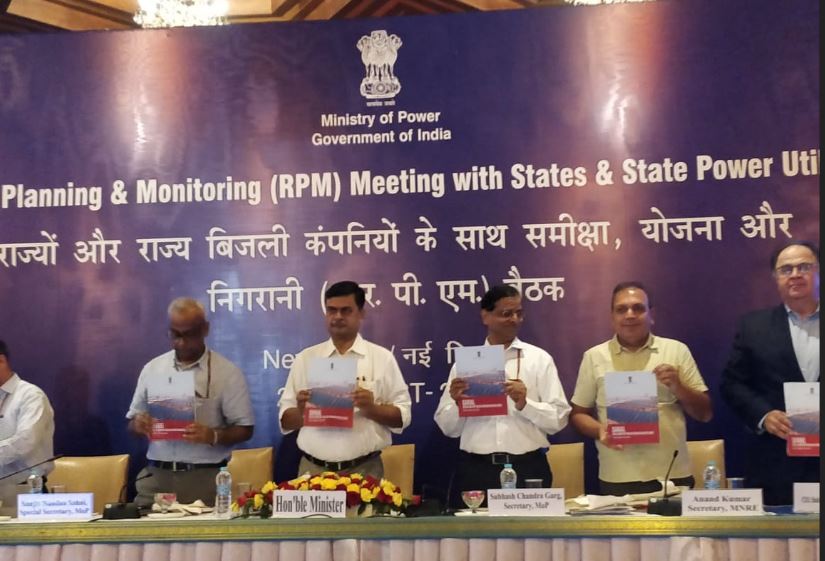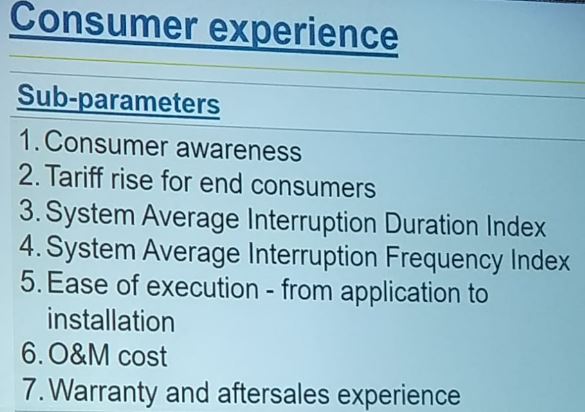

The SARAL index comes at an opportune time for the sector, and states, with rooftop solar lagging behind other categories when it comes to targets. Out of a 100 GW target for Solar by March 2022, grid-connected rooftop solar is supposed to be 40GW, a figure it that is over 90% pending on date.
The MNRE acknowledges that achieving our rooftop solar targets will require an ecosystem that ensures information symmetry, access to financing and clear market signals. Thus, the SARAL index, that evaluates Indian states based on their attractiveness for rooftop development.
The SARAL index currently captures five key aspects (i) robustness of policy framework (ii) implementation environment (iii) investment climate (iv) consumer experience (v) business ecosystem. These aspects have also been assigned different weightages, with consumer experience and effectiveness of policy framework and implementation on top at 26% each. A state’s business ecosystem gets the lowest weightage at 11%, while the investment climate for rooftop solar has a 17% weightage.
Robustness of policy framework comes in at 20% weightage. Each of these aspects has a number of individual scoring indicators or sub-parameters, ensuring an index that captures pretty much every parameter that matters. The idea is to encourage some friendly competition among states, with each state able to assess the initiatives taken so far, and what it can do to improve its solar rooftop ecosystem. The hope is that this will help states to channelize investments that can eventually help the sector grow.


For industry watchers, the index is also one way to serve as a fast starting point when it comes to evaluating state-level policies and ease of doing business, in solar. With a focus on using parameters that are well within the control of a state government, besides information collected from public sources, the index seeks to leave little scope for dispute on its fairness or accuracy.
For the record, Karnataka leads the index right now with a Saral score of 78.8, followed by Telangana (72.2) and Gujarat (67.9) respectively. Jammu and Kashmir brings up the rear, with a score of 14.4.
After the launch of the event, R K Singh said that all the states should look at their grades and work on improving their grades for the SARAL ratings that will be issued next year.
“What we will do is compile all the policy initiatives, incentives, reforms from the top 4-5 states and share the document with all the other states. We insist that these initiatives are followed by all the states to improve their grades.”
“Discoms can empanel the agencies, and upload it to their websites. A consumer may only need to go to the discom websites, fill out an application for installing a rooftop system and then in the next step select the vendor they want. This will make the process a lot easier for all involved parties,” he added.
We believe the index is a great tool to help investors and other stakeholders in the solar rooftop sector, and the MNRE should take it upon itself to ensure it gets due visibility and prominence. Of course, one does wish that other ideas to promote rooftop solar, like a single central window for approvals could also have been considered, but perhaps that was a bridge too far in a federal structure.
SARAL has been designed collaboratively by the Ministry of New and Renewable Energy (MNRE), Shakti Sustainable Energy Foundation (SSEF), Associated Chambers of Commerce and Industry of India (ASSOCHAM) and Ernst & Young (EY).
The curtain raiser for the 2nd edition of the India Bioenergy & Tech Expo (IBETE…
In light of the ongoing debate on whether flue gas desulphurisation (FGD) systems in coal-fired…
In a key step toward advancing clean energy adoption, Ahmedabad headquartered IRM Energy Ltd has…
Biofuels conglomerate Aemetis has announced that its subsidiary in India – Universal Biofuels – has…
The Greater Noida Industrial Development Authority (GNIDA) has commenced construction of a 300-tonne-per-day (TPD) bio-CNG…
The World Earth Day – with this year’s theme on ‘Our Power, Our Planet’ –…